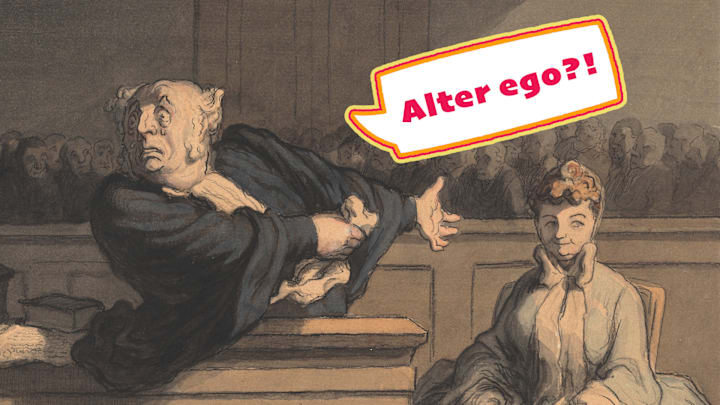With the slightest context, you know if someone’s talking about a suit you wear or a suit you file. The same is true for other everyday words that mean something different in courtrooms: charge, appeal, and so forth.
However, there are many other terms whose legal definitions are less widely understood by the general public. In fact, you might not even have realized these terms had legal definitions at all. Here’s what law professionals mean when they talk about alter egos, tolls, and more.
Abscond
The word abscond (leaving secretly or fleeing into hiding) often implies criminality: You might abscond with stolen goods, for example. But we also use the term in lawful situations—like when your dog absconds with your sandwich.
The legal sense of abscond has more specific parameters: It refers to leaving your jurisdiction in order to avoid judicial proceedings. You might abscond to avoid getting arrested for a crime or getting served notice of a lawsuit. Some people abscond while awaiting trial or while they’re on probation or parole. Absconding is generally considered a crime, though not every instance is intentional. Say you’re on probation, and your probation officer has to approve any travel outside your jurisdiction—but you forget to get their permission when a family emergency requires you to fly across the country. You’ve technically absconded, and you may have to attend a probation violation hearing. If the judge is sympathetic to your situation, they might just let you off the hook.
Alter ego

While the legal kind of alter ego lacks the glamour of David Bowie’s Ziggy Stardust, it still embodies the Latin meaning of the phrase: “another I.” Generally, individuals (or a group of individuals, like shareholders) aren’t liable for a company’s actions or debts. But if a court finds that an individual is using a company as a front for personal business—in other words, the company is merely an alter ego of the individual rather than a separate entity—the alter ego doctrine allows the court to hold the individual responsible (known as piercing the corporate veil). Say you take out a small business loan, use the money to fund an expansion on your house, and then default on said loan. A court may invoke the alter ego doctrine to make you personally pay up.
Caveat
Caveat, Latin for “let [a person] beware,” refers to a notice asking a judicial officer to suspend a certain action until the caveator has the chance to be heard. Caveats often crop up in probate proceedings. Say your wealthy grandmother planned to leave everything to you, her only grandchild. She dies suddenly—and you learn that the night before her death, she replaced you in her will with a distant cousin you’ve never heard of. You might file a caveat to prevent her estate from passing into your cousin’s hands before you’ve had a chance to dispute the will’s validity.
Information
When someone is suspected of a felony—often defined as a crime punishable by death or by imprisonment that lasts more than one year—they must be formally charged by a grand jury in order for a trial to occur. The grand jury’s written accusation is known as an indictment. But for crimes that hold lighter sentences (i.e., misdemeanors), a grand jury isn’t necessary. Instead, a prosecutor can issue a written accusation called an “information.”
That said, a defendant can waive their constitutional right to an indictment if the felony isn’t punishable by death. If they do waive it, a prosecutor can charge them via information. You might waive an indictment if there’s a plea bargain in play: Maybe a prosecutor has offered you the chance to plead guilty to lighter charges than a grand jury would accuse you of. So you waive your indictment and take the deal.
Toll

To a layperson, toll calls to mind bridges and bells. A lawyer might think of a different sense first: “to stop the running of a time period, especially a time period set by a statute of limitations,” per Wex, a legal encyclopedia hosted by Cornell Law School’s Legal Information Institute. For example, there are state laws that toll the statute of limitations for minors who may have grounds to file a negligence claim. If the time limit on filing a claim is two years after the offense occurred, that two-year clock won’t start ticking until the person turns 18.
Venue
In law, a venue is a geographical location—usually a judicial district or county—chosen for a trial (also meaning that the jury, if there is one, will be selected from among its residents). Criminal cases often base the venue on where the crime occurred; in civil cases, it may be where the defendant lives, where most of the witnesses live, or some other logical location. Parties can request a change of venue if they feel it’s been poorly chosen or extenuating circumstances have occurred. If a crime has been publicized to the point that it would be hard to find an impartial jury within a certain district, for instance, a change of venue might be necessary.
Learn More About Words:
